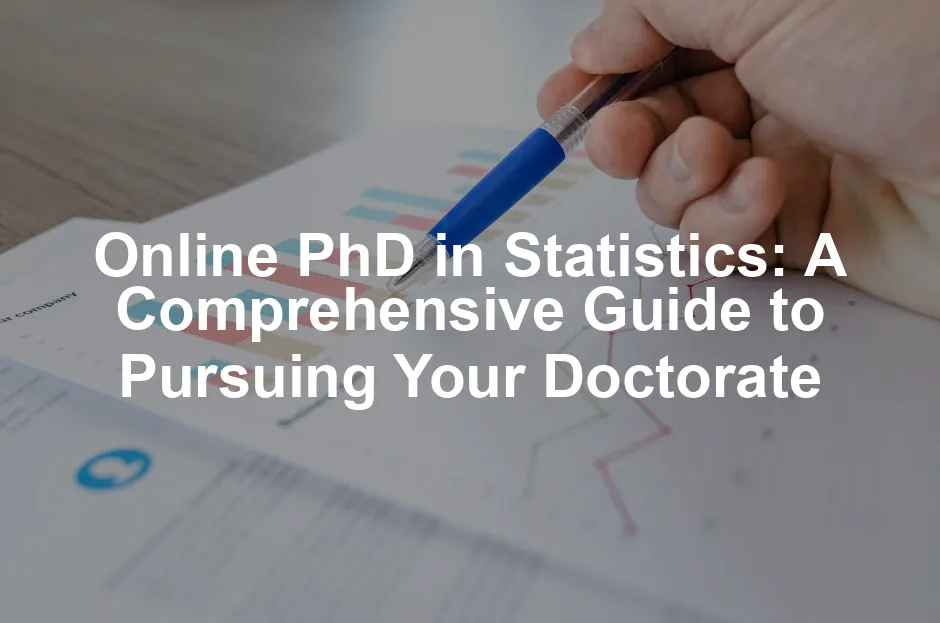Introduction
An online PhD in Statistics offers a golden opportunity for those passionate about numbers. Imagine earning a doctoral degree from the comfort of your couch! This program is ideal for individuals who want to advance their careers without sacrificing their current jobs.
With the explosion of data in every sector, the demand for statisticians is skyrocketing. Statisticians are the unsung heroes behind data-driven decisions. Whether in healthcare, finance, or tech, their expertise is invaluable. Obtaining a PhD in Statistics not only enhances your skills but also significantly boosts your career prospects.
Flexibility is the name of the game with online programs. They cater to working professionals who juggle jobs, families, and studies. You can attend lectures in your pajamas while sipping coffee! These programs are designed to fit around your busy life, allowing you to study at your own pace.
In this comprehensive guide, we’ll unravel everything you need to know about pursuing an online PhD in Statistics. We’ll cover program structures, spotlight top universities, outline admission requirements, explore career opportunities, and answer frequently asked questions. By the end, you’ll have a solid understanding of how to embark on this exciting academic journey.

Understanding the Online PhD in Statistics
What is an Online PhD in Statistics?
An online PhD in Statistics is a rigorous program that combines theoretical knowledge with practical applications. It prepares students for advanced research and expert roles in statistics. Unlike traditional on-campus programs, online PhD programs offer the same quality of education but with the added convenience of remote learning. This means you can study from anywhere, whether it’s a sunny beach or your living room.
Online programs typically involve coursework, comprehensive examinations, and a dissertation. Students engage in extensive research, often collaborating with faculty members and peers from various locations. This interaction can lead to innovative statistical methods and models that push the boundaries of the field.
If you’re looking to deepen your understanding of statistical techniques, consider picking up Statistical Methods for the Social Sciences. It provides a solid foundation that will benefit students in their academic pursuits.

Importance of Statistics in Various Fields
Statistics plays a crucial role in numerous industries. In healthcare, for instance, statisticians analyze clinical trial data to evaluate new treatments’ efficacy. In finance, they assess risk and forecast market trends. The tech industry relies on statisticians to improve algorithms and enhance user experiences.
The job market for statisticians is booming. According to the U.S. Bureau of Labor Statistics, there’s a projected job growth of 31% for PhD holders in statistics over the next decade. This growth is significantly higher than the average for other occupations. With this degree, you’ll be well-positioned to meet the increasing demand for skilled professionals who can interpret complex data.
In summary, pursuing an online PhD in Statistics is not just about personal growth; it’s about stepping into a field bursting with opportunities. As data becomes more integral to decision-making across sectors, your expertise will be more vital than ever.
To further enhance your skills in data analysis, a great resource is Python for Data Analysis. This book provides practical guidance on using Python to analyze data effectively.

Top Online PhD Programs in Statistics
Overview of Leading Institutions
When it comes to pursuing an online PhD in Statistics, several prestigious universities offer exceptional programs. Here’s a look at some top institutions that provide these advanced degrees, blending quality education with flexible online delivery.

University of Pennsylvania
The University of Pennsylvania, specifically the Wharton School, offers a robust PhD program in Statistics. This program emphasizes both theoretical research and practical statistical applications. With a graduation rate of 96%, it prepares students for high-level careers in academia and industry. The tuition is approximately $38,732 per year, which is competitive considering the quality of education provided. Students have opportunities to engage in interdisciplinary research across various fields, including finance and biostatistics.

Harvard University
Harvard University is renowned for its academic excellence, and its PhD in Statistics is no exception. The program is designed to develop strong research skills and critical thinking in students. Admission requirements include a solid mathematical background and previous coursework in statistics. The tuition stands at around $50,928, reflecting the institution’s prestige. Graduates are well-prepared for roles in academia and industry, often excelling in statistical inference and data analysis.

Stanford University
Stanford University offers a unique online PhD program in Statistics that stands out due to its flexibility and innovative research opportunities. Students can tailor their studies to suit their interests, including areas like machine learning and Bayesian statistics. The program’s tuition is about $54,315, and it boasts a graduation rate of 96%. Students are encouraged to collaborate with faculty on cutting-edge research, enhancing their academic and professional profiles.

University of North Carolina at Chapel Hill
The University of North Carolina at Chapel Hill provides a comprehensive online PhD program in Statistics. This program offers various specializations, including biostatistics and data science, allowing students to align their studies with career goals. The faculty is highly regarded, with expertise in both theoretical and applied statistics. Tuition is approximately $10,552 per year, making it a cost-effective choice. The graduation rate of 90% highlights the program’s effectiveness in guiding students toward successful completion.
University of Michigan
At the University of Michigan, the online PhD program in Statistics emphasizes both theoretical foundations and practical applications. The program includes a diverse curriculum, rich online resources, and opportunities for research across multiple disciplines. Tuition for this program is around $48,000, which reflects its comprehensive offerings. The program is designed to be flexible, catering to the needs of working professionals while maintaining rigorous academic standards.

Program Features and Specializations
Online PhD programs in Statistics commonly feature various specializations, allowing students to focus on areas that align with their interests and career aspirations. Here are some popular specializations:
- Data Science: This specialization focuses on the techniques and tools used to analyze and interpret complex datasets. Students learn about machine learning, data mining, and predictive analytics, preparing them for roles in tech and business.
- Biostatistics: Tailored for those interested in applying statistical methods to biological and health-related fields, this specialization covers topics like clinical trials, epidemiology, and health data analysis.
- Financial Mathematics: This area combines finance and statistics, equipping students with the skills to analyze financial data, assess risks, and develop quantitative models for financial decision-making.
- Bioinformatics: This specialization merges statistics with biology, focusing on the analysis of biological data, particularly in genomics and molecular biology. Students learn to apply statistical techniques to solve biological questions and interpret data from experiments.
Each of these specializations provides a unique perspective on the application of statistics, ensuring that graduates are well-equipped for diverse career paths in academia, industry, and government sectors. The flexibility of online programs facilitates a tailored learning experience, making advanced education accessible to a broad range of professionals.

For those looking to visualize their data effectively, consider exploring The Big Book of Dashboards. It provides real-world business scenarios for effective data visualization.

Program Structure and Requirements
Typical Curriculum
Pursuing an online PhD in Statistics involves a well-rounded and rigorous curriculum. Students can expect to engage in core coursework that lays the foundation for advanced statistical knowledge. Key subjects typically include:
- Statistical Theory: This forms the backbone of the curriculum, covering essential concepts like probability, inference, and estimation.
- Computational Statistics: Students learn to apply statistical methods using programming languages such as R and Python.
- Applied Statistics: Real-world applications of statistical methods are explored, preparing students for practical challenges.
- Bayesian Statistics: This modern approach to statistics emphasizes the importance of prior knowledge in statistical inference.
Electives offer students the chance to tailor their education to their interests. Popular options may include:
- Biostatistics: Focused on medical and health-related data analysis.
- Data Science: Blending statistics with machine learning and big data analytics.
- Financial Mathematics: A specialization for those interested in finance-related statistical methods.
Research components are also critical. Most programs require students to complete comprehensive exams, which test their knowledge across various statistical domains. The pinnacle of the program is the dissertation, where students conduct original research. This process not only hones their analytical skills but also contributes new knowledge to the field of statistics.

If you’re interested in diving deeper into statistical learning, check out An Introduction to Statistical Learning. It’s a must-read for anyone serious about data science.

Admission Requirements
Admission to an online PhD in Statistics program is competitive. Common prerequisites include:
- Academic Background: Applicants typically need a master’s degree in statistics, mathematics, or a closely related field.
- GRE Scores: Some institutions require GRE scores, while others may waive this requirement based on professional experience or academic performance.
- Transcripts: Official transcripts must demonstrate a solid academic foundation, often requiring a minimum GPA of 3.0.
- Letters of Recommendation: Most programs request two to three letters from academic or professional references who can attest to the applicant’s capabilities and potential.
- Statement of Purpose: A well-crafted essay outlining the applicant’s research interests and career goals is crucial.
It’s essential to check specific requirements, as they can vary significantly between institutions. Some programs might also require interviews or additional materials, such as a portfolio of work.

Financial Considerations
Financing your online PhD in Statistics can be a significant concern. Tuition costs vary widely, depending on the institution. For example, top universities may charge upwards of $50,000 per year, while others offer more affordable options around $10,000.
Fortunately, several financial aid options are available:
- Scholarships and Grants: Many institutions provide merit-based scholarships to help offset costs. Researching available grants is also beneficial.
- Graduate Assistantships: These positions often come with tuition waivers and stipends in exchange for teaching or research duties. This not only helps financially but also builds valuable experience.
- Federal Aid: Completing the FAFSA can unlock federal loans and additional funding opportunities for eligible students.
- Employer Sponsorship: Some companies offer tuition assistance for employees pursuing advanced degrees, particularly in fields relevant to their business.
It’s crucial to consider the total cost of attendance, including fees, textbooks, and living expenses when budgeting for your PhD. Taking advantage of financial aid options can make a significant difference in managing these costs.

Career Opportunities After Earning an Online PhD in Statistics
Job Prospects
Earning an online PhD in Statistics opens a treasure chest of career opportunities. Graduates can find themselves on various professional paths, depending on their interests and goals. One prominent avenue is academia. Many PhD holders pursue positions as professors or researchers at universities. They get to teach the next generation of data wizards while conducting groundbreaking research. Imagine being the one shaping the minds of future statisticians!
But academia isn’t the only game in town. Industry roles are booming too. Data scientists are in high demand, and they often command impressive salaries. These pros analyze complex data sets to derive meaningful insights, helping companies make data-driven decisions. Statisticians and quantitative analysts also play crucial roles in businesses, using their skills to interpret data and inform strategies. Whether it’s developing predictive models or optimizing processes, the opportunities are vast.
Let’s not forget about the government sector. Graduates can work as statistical analysts or policy advisors, contributing to essential projects that affect public policy and resource allocation. Their expertise helps governments make informed decisions backed by solid data. From healthcare initiatives to economic analysis, the impact of statisticians in government is undeniable.
For those who want to dive deeper into data science, Data Science for Business is a fantastic resource. It bridges the gap between business and data analysis.

Salary Expectations
Now, let’s talk numbers—specifically, salary expectations for PhD graduates in statistics. According to recent data, the median salary for statisticians hovers around $96,280 per year. But that’s just the tip of the iceberg! Data scientists, often the rock stars of the data world, can earn even more, with median salaries reaching approximately $112,110 annually.
As for job growth, the future looks bright. The U.S. Bureau of Labor Statistics projects a whopping 31% job growth rate for statisticians over the next decade. Data scientists are also riding the wave, with similar growth expectations as industries increasingly rely on data analysis. This means not only are there jobs available, but the demand is escalating, making it an opportune time to enter the field.
In summary, the career landscape after earning an online PhD in Statistics is vast and varied. From academia to industry and government, numerous opportunities await. With impressive salaries and strong job growth, it’s a rewarding field for those passionate about numbers and analytics.

Challenges and Considerations
Balancing Work and Study
Pursuing an online PhD while working full-time can feel like juggling flaming torches. It’s a challenge, but with the right strategies, it’s manageable. The key lies in effective time management and maintaining a work-life balance.
First, establish a solid routine. Set aside specific times for studying, just like you would for a job. Consistency is crucial. Create a schedule that includes dedicated study blocks, ensuring your academic commitments are prioritized alongside work responsibilities.
Next, learn to say no. If your plate is already full, it’s okay to decline additional commitments, whether they’re social invites or extra work projects. Protecting your study time is essential for success. Also, leverage technology. Online tools can help you stay organized and keep track of deadlines, assignments, and research progress.
Don’t forget to communicate with your employer. Many companies value continued education and may offer flexible hours or support. Keeping your employer in the loop about your academic journey can lead to understanding and adjustments that benefit both parties.
Lastly, take breaks. It’s important to recharge and avoid burnout. Whether it’s a short walk or a coffee break, stepping away from your studies can enhance productivity when you return.
In conclusion, while balancing work and study in an online PhD program can be daunting, with strategic planning and support, it can be a rewarding experience that leads to both personal and professional growth.

Importance of Networking
Networking is a vital part of any academic journey, especially for PhD students in statistics. It’s not just about who you know; it’s about the connections that can propel your career forward. In academia, networking opens doors to collaborations, research opportunities, and mentorship. You can find yourself working alongside seasoned professionals who can guide you through the treacherous waters of dissertation writing and publication. Plus, who doesn’t want to sip coffee with a fellow statistician and brainstorm the next big thing?
In the industry, the benefits of networking are equally profound. Many statisticians transition into roles that require collaboration with data scientists, economists, or business analysts. These interactions can lead to job offers or collaborative projects. Attending industry conferences and workshops can expose you to potential employers and give you a competitive edge. It’s like dating, but instead of swiping right, you’re shaking hands and sharing ideas.
Professional organizations play a significant role in facilitating networking. Consider joining the American Statistical Association (ASA). This organization offers resources, workshops, and conferences tailored to statisticians. You’ll connect with like-minded individuals and gain access to job boards that list opportunities in your field. Another great option is the International Statistical Institute (ISI), which promotes global collaboration among statisticians. They host events that allow you to network with professionals from various countries.
Conferences are another golden opportunity. Events like the Joint Statistical Meetings (JSM) and the International Conference on Statistical Sciences not only showcase the latest research but also provide ample chances to meet industry leaders. These gatherings are where you can find mentors and peers who share your passions.
In summary, networking is essential for PhD students. It fosters relationships that can enhance your academic and professional journey. By engaging with organizations and attending events, you can broaden your horizons and boost your career prospects.

Conclusion
Pursuing an online PhD in Statistics can be a transformative experience. This program equips you with advanced skills that are in high demand across various fields, from healthcare to finance. As we’ve explored, obtaining this degree not only enhances your statistical knowledge but also opens doors to exciting career opportunities.
The flexibility of online programs allows you to balance work, studies, and personal life. You can engage in rigorous statistical research without compromising your current job. This adaptability makes it an appealing choice for many working professionals.
The job market for statisticians is flourishing. With a projected job growth rate of 31% over the next decade, statisticians are needed more than ever. Companies and organizations rely on your expertise to make data-driven decisions that shape their futures. You become a crucial player in a world increasingly governed by data.
Moreover, the networking opportunities that arise during your studies can lead to collaborations and job offers. Engaging with fellow students and professionals can enrich your educational journey and provide invaluable insights into the industry.
In essence, an online PhD in Statistics is not just about acquiring a degree; it’s about positioning yourself for success in a data-driven world. So, take the plunge! Explore your options, weigh the benefits, and consider pursuing this exciting academic endeavor. Your future self will thank you for it!
FAQs About Online PhD in Statistics
Why should you pursue an online statistics Ph.D. program?
Pursuing an online statistics Ph.D. program offers remarkable flexibility. You can work while studying, allowing you to gain practical experience without putting your career on hold. Many programs are designed to accommodate your schedule, making it easier than ever to balance personal and professional commitments.
Moreover, an online PhD enhances career advancement opportunities. The skills and knowledge gained through these programs are highly sought after in various industries. With a PhD, you can position yourself for leadership roles or specialized positions that require advanced statistical expertise.
Is an online doctorate credible?
Yes, an online doctorate is credible, provided it comes from a regionally accredited institution. Accreditation guarantees that the program meets established academic standards. Many reputable universities offer online PhD programs in statistics that hold the same weight as their on-campus counterparts.
Choosing a recognized program is crucial. Always research the institution’s accreditation status and read reviews from former students. This due diligence ensures you receive a quality education that employers respect.
What schools offer Ph.D. programs?
Beyond the top universities like Harvard, Stanford, and the University of Pennsylvania, several institutions offer reputable online Ph.D. programs in statistics. Notable options include:
- University of Rochester: Known for its strong emphasis on applied statistics and data analysis.
- University of North Carolina at Chapel Hill: Offers specializations in biostatistics and data science, preparing graduates for diverse career paths.
- University of Michigan: Features a flexible program with opportunities for interdisciplinary research.
- Arizona State University: Focuses on applied statistics and provides excellent resources for online learners.
These institutions provide robust programs that cater to various professional interests and academic goals. To complement your studies, consider investing in R for Data Science. It’s a fantastic resource for learning data science techniques using R.
What are the admission requirements?
While admission requirements vary by university, common prerequisites typically include:
- A master’s degree in statistics, mathematics, or a related field.
- Official transcripts demonstrating academic performance.
- Letters of recommendation from previous professors or employers.
- A personal statement outlining your research interests and career goals.
- Some programs may require GRE scores, while others may waive this requirement based on relevant experience.
Always check the specific requirements of your chosen institution to ensure you meet their criteria.
Is statistics a lucrative career option?
Absolutely! Statistics is a lucrative career choice. As of recent data, the median salary for statisticians is approximately $96,280 annually. However, this can vary significantly based on factors such as experience, location, and industry.
Job growth projections are equally promising, with a 31% increase expected over the next decade. This demand is fueled by the increasing reliance on data in decision-making processes across sectors like healthcare, finance, and technology. With a PhD in statistics, you can command higher salaries and access advanced roles that offer exciting challenges.
How long does it typically take to complete an online PhD?
Generally, completing an online PhD in Statistics takes about four to five years, depending on the program structure and your pace of study. Factors that may affect this timeline include:
- The amount of coursework required.
- The time taken to complete comprehensive exams.
- Research timelines for your dissertation.
Many programs offer part-time options, allowing you to tailor your studies to fit your schedule. Always consult your desired program for specific duration insights.
Please let us know what you think about our content by leaving a comment down below!
Thank you for reading till here 🙂
If you are interested in enhancing your statistical knowledge further, consider pursuing a master of science in applied statistics for social science research.
All images from Pexels




